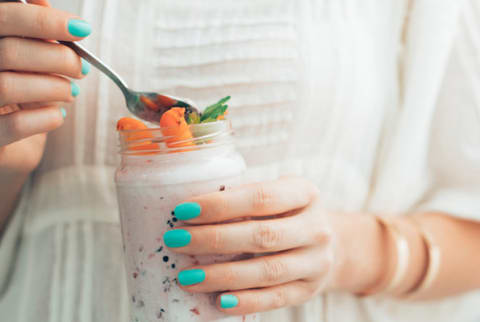Advertisement
7 Things Not To Do When You Give Up Sugar


Sugar has become the new fat, rightly ostracized for making us sick, overweight, tired and prematurely old. As sugar's numerous problems continue to surface, switching to a diet low in the white stuff might be the best thing you can do for your health and waistline. Among sobering sugar statistics, the average person eats 22 teaspoons of added sugar a day, and for adolescents that number spikes to a whopping 32 teaspoons.
Ditching sugar can help you burn fat, feel better and finally crush your addiction, but do it incorrectly and you'll stymie your efforts. Here are seven mistakes you don't want to make when you give up sugar:
1. Switching to diet sodas.
"By now, we're all aware that diet soda isn't the 'healthy' alternative to regular soda it's sometimes thought to be," writes Allie White. "Studies have found that it messes with blood pressure, increases the risk of heart disease and can cause some serious reproductive issues."
While moving from regular to diet soda will eliminate a huge source of sugar, it's far from healthy and the negative effects far outweigh any positives.
2. Only eating foods labeled "sugar-free."
Don't think you're better off if you're eating the calorie-free stuff. Artificial sweeteners let you think you beat the system by eating something sweet without the calories, but your body isn't in on the trick. It sets its sugar metabolism machinery in motion and screams for glucose, which means you'll probably just end up eating more.
Ditto for "no sugar added": processed foods with such claims often include artificial sweeteners, excessive amounts of sugar alcohol, and naturally occurring sugar. When in doubt, read the ingredients.
3. Only eating foods labeled "lite" or "fat-free."
"Light" or "fat free" often become code words for high-sugar impact. "For decades, we blamed fat for making us fat," writes Dr. Mark Hyman. "It sounds so simple, right? Just cut out the fat and you'll get lean. Except while manufacturers touted their 'healthy' fat-free and low-fat Frankenfoods, added sugar was slipping in through the back door, and the consequences have wreaked havoc on our health and our waistlines."
4. Overdoing it on fruit.
Fruit is fabulous if you're eating the right kinds in the right amounts. Berries are the best. But be careful, as too much fruit can overload your liver with fructose, which becomes repackaged as triglycerides and finds a nice home around your midsection. If you eat fruit, stick with one or two servings of berries or other lower-glycemic fruit and call it quits.
5. Completely eliminating sugar all at once.
I know completely dumping sugar all at once becomes conventional wisdom in certain diet circles, but how has that worked for you so far? Exactly. There are a few things going cold turkey will do for you, and losing weight isn't one of them. Instead, you'll be shaky, irritable, lethargic, starving and craving sugar— not the outcome we're after.
6. Falling for hidden sugars.
Fully aware you're sugar savvy, manufacturers disguise sugar under non-sugar sounding names. Did you know there are 41 other names sugar can hide under on a label? Scrutinize ingredients closely and become aware of any hidden sugars.
7. Falling for sneaky sugars.
You may be eating more sugar than you realize. Sneaky sources include balsamic vinaigrette dressings, marinara sauce, glazed meats, and fruit-on-the-bottom yogurt. Scrutinize ingredients closely, ask your server questions and never assume any food is automatically low-sugar impact just because it doesn't taste sweet.
If you've abandoned sugar and reclaimed your taste buds, what did you find most challenging about transitioning into low-sugar impact eating?

JJ Virgin, CNS, BCHN, is a celebrity nutrition and fitness expert who helps clients lose weight fast by breaking free from food intolerance. A certified nutrition specialist, board certified Holistic Nutritionist, and Certified Exercise Physiologist, she is the author of the New York Times best-sellers The Virgin Diet: Drop 7 Foods, Lose 7 Pounds, Just 7 Days and The Virgin Diet Cookbook: 150 Easy and Delicious Recipes to Lose Weight and Feel Better Fast.
More from the author:
Functional Nutrition Training
Check out Functional Nutrition Coaching
A cutting-edge nutrition deep dive taught by 20+ top health & wellness experts
Learn moreMore from the author:
Functional Nutrition Training
Check out Functional Nutrition Coaching
A cutting-edge nutrition deep dive taught by 20+ top health & wellness experts
Learn more
JJ Virgin, CNS, BCHN, is a celebrity nutrition and fitness expert who helps clients lose weight fast by breaking free from food intolerance. A certified nutrition specialist, board certified Holistic Nutritionist, and Certified Exercise Physiologist, she is the author of the New York Times best-sellers The Virgin Diet: Drop 7 Foods, Lose 7 Pounds, Just 7 Days and The Virgin Diet Cookbook: 150 Easy and Delicious Recipes to Lose Weight and Feel Better Fast.

Why Nutrition Is Key To Changing Your Relationship With Alcohol
Brooke Scheller, DCN, CNS

Why Alcohol Sabotages Your Gut Health & How To Get Back On Track
Brooke Scheller, DCN, CNS

Why Nutrition Is Key To Changing Your Relationship With Alcohol
Brooke Scheller, DCN, CNS

Why Alcohol Sabotages Your Gut Health & How To Get Back On Track
Brooke Scheller, DCN, CNS

Why Nutrition Is Key To Changing Your Relationship With Alcohol
Brooke Scheller, DCN, CNS

Why Alcohol Sabotages Your Gut Health & How To Get Back On Track
Brooke Scheller, DCN, CNS

Why Nutrition Is Key To Changing Your Relationship With Alcohol
Brooke Scheller, DCN, CNS

Why Alcohol Sabotages Your Gut Health & How To Get Back On Track
Brooke Scheller, DCN, CNS














